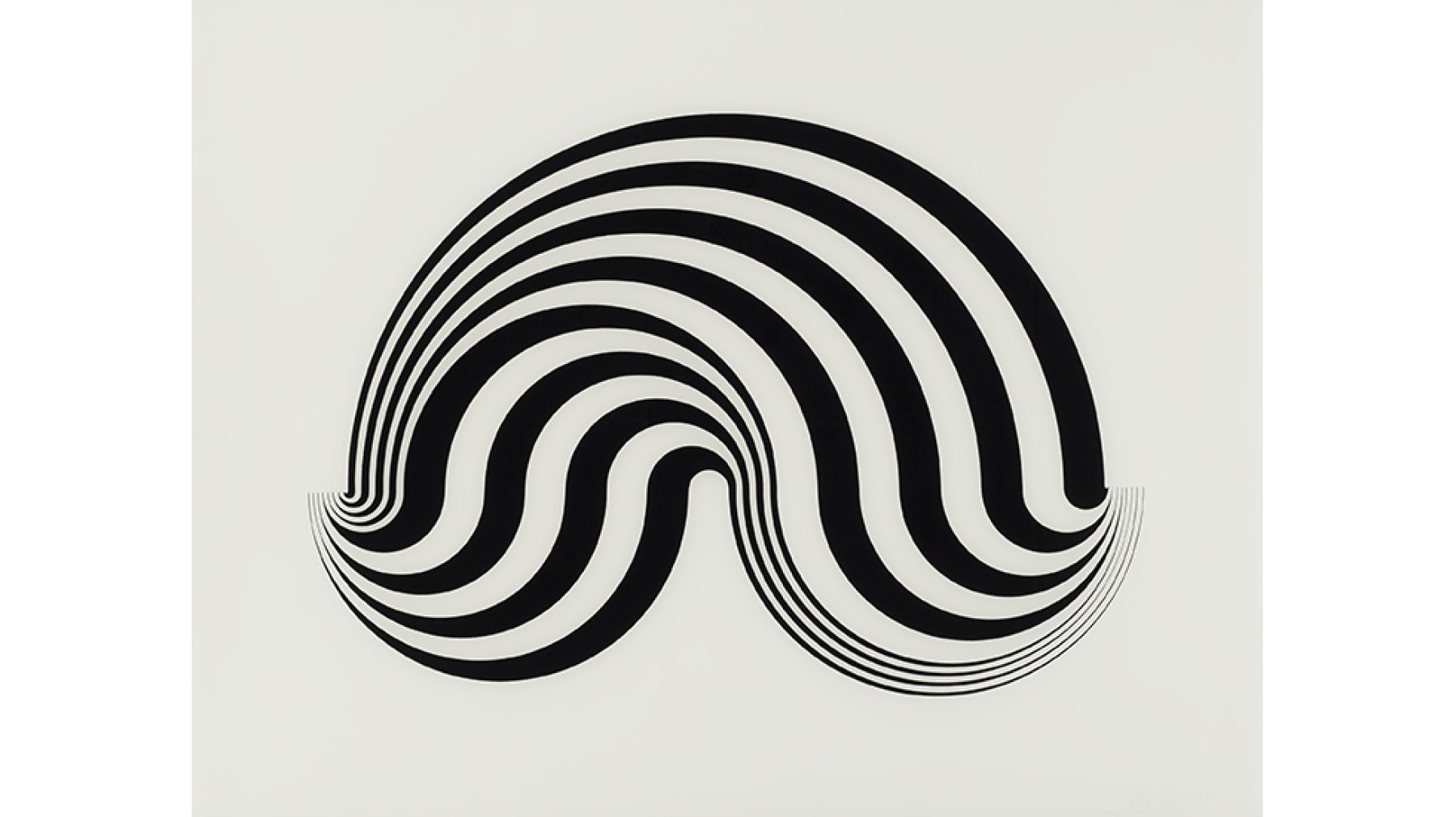This exhibition was on view from August 30 to October 7, 2012.
circa 1963

Bridget Riley, Untitled (Fragment 5), 1965. Screen print printed on the verso of an acrylic sheet. Harvard Art Museums/Fogg Museum, Gift of Robert Bradford Wheaton and Barbara Ketcham Wheaton, M25923 Photo: Imaging Department © President and Fellows of Harvard College.
The Carpenter Center for the Visual Arts at Harvard University is Le Corbusier's only building in North America, and one of the last to be completed during his lifetime. In May 2013, the Carpenter Center for the Visual Arts will celebrate its 50th anniversary as an architectural and artistic landmark.
Programming throughout Fall 2012 and Spring 2013 showcases the Carpenter Center's vibrant history in diverse and creative ways that highlight the uniqueness of the building and its contributions to the artistic life of the University while celebrating Le Corbusier's inventive synthesis of art and architecture.
circa 1963 opens the anniversary year with an exhibition of iconic works from the early to mid-1960s. Le Corbusier designed the Carpenter Center to be a laboratory for creative and critical thinking. Its open and interconnecting spaces are meant not only to encourage experimentation, but also to create opportunities for interdisciplinary conversations and collaborations. The exhibition frames the history of the building critically and historically, and sets the cultural and artistic context for the 50th anniversary exhibitions and programming that will follow. Drawing on works in diverse media, circa 1963 thus presents an eclectic picture of what "contemporaneity" meant in the years of the building's beginnings. The exhibition includes artists who taught or were associated with the Center in its formative years, many of whom contributed to a vision of "Cambridge Modernism" as a new extension of Bauhaus ideals of experimentation and abstraction, and cross-media explorations of the visual arts. The works featured in this exhibition each present creative and conceptual investigations of color, form, and design so as to open new perceptual relationships between drawing, painting, sculpture, and photography and their social environments.
Curated by David Rodowick, director of the Carpenter Center, the exhibition presents selections from the collection of the Harvard Art Museums/Fogg Museum, the Addison Gallery of American Art, and the Estate of Peter Moore, including works by Josef Albers, Albert Alcalay, Eduardo Chillida, Dimitri Hadzi, György Kepes, Sol LeWitt, Roy Lichtenstein, Morris Louis, George Maciunas, Peter Moore, Yoko Ono, Bridget Riley, Ben Shahn, Aaron Siskind and George Sugarman.
David Rodowick is the Chair of the Department of Visual and Environmental Studies and Director of the Carpenter Center for the Visual Arts at Harvard University. He is the author of numerous essays as well as five books: The Virtual Life of Film (Harvard University Press, 2007); Reading the Figural, or, Philosophy after the New Media (Duke University Press, 2001); Gilles Deleuze's Time Machine (Duke University Press, 1997); The Difficulty of Difference: Psychoanalysis, Sexual Difference, and Film Theory (Routledge, 1991); and The Crisis of Political Modernism: Criticism and Ideology in Contemporary Film Theory (University of Illinois Press, 1989; 2nd edition, University of California Press, 1994). Having taught at Yale University until 1991, Rodowick began the film studies program there. After studying cinema and comparative literature at the University of Texas, Austin, and Université de Paris 3, he obtained a PhD at the University of Iowa in 1983. Rodowick subsequently taught at the University of Rochester and at King's College, University of London, where he founded the film studies program and the Film Study Center. Special research interests include aesthetics and the philosophy of art, the history of film theory, philosophical approaches to contemporary art and culture, and the impact of new technologies on contemporary society. Rodowick has also been an award-winning experimental filmmaker and video artist. In 2002, he was named an Academy Film Scholar by the Academy of Motion Picture Arts and Sciences. His edited collection, Afterimages of Gilles Deleuze's Film Philosophy, was published by University of Minnesota Press in 2009. Rodowick's essay, "An Elegy for Theory," received the Katherine Singer Kovacs Essay Award from the Society for Cinema and Media Studies in 2009.
Archive
Explore more of our rich history through our archive.